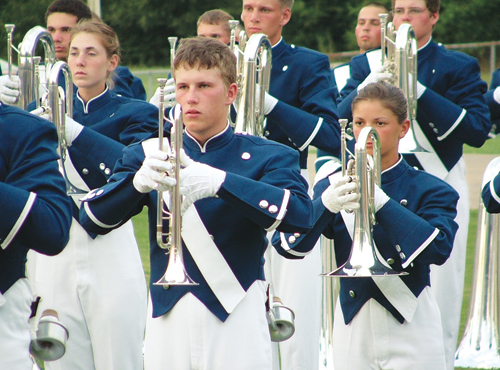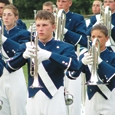
Hosting a music festival is a rewarding experience for directors, their students, and the school, as well as for parents and the community. A successful festival requires substantial advance planning and preparation, which must be initiated and coordinated by the director. These efforts have great rewards. Whether it is an exhibition, a competitive marching band festival, or a large ensemble adjudication or contest, the benefits that may flow from hosting such an event tend to be valuable, long-lasting, and worthwhile.
The Initial Planning
Advance planning and preparation is of paramount importance, and good planning does not happen by accident. The first major step is to obtain permission to host such an event your school district’s administration and school board. This should be done at least a year in advance.
Here are some steps to keep in mind during the initial planning stage (with notes on suggested timing for each):
• Once you have permission to host the event, meet with your principal and athletic director to review the dates for the festival (at least one year out).
• If the event involves multiple groups from other schools, send out invitations (by mail, email, phone) to potential participating groups (at least six months out).
• If you need judges (marching festival or concert band adjudicators), contact potential candidates (at least six months out).
• Reserve any needed facilities (internally) with your administration (six to eight months out).
• Contact a guest conductor for an honor band (one year out, although the earlier you can contact them, the better).
Each year I meet with the athletic director to review the schedule for all sports and to find the best possible fit for our annual marching band festival. When I have hosted an honor band festival, I have sought permission to host the event as early as three years out. Part of this advanced planning is based on forecasting which students might be involved, making sure there are no conflicts with athletic events, and also balancing the event against our biennial band trips. If the dates for the festival are mandated by a music association to which you belong, it is important for your administration to understand that these dates must be given priority when your school is the host.
With marching band festivals, bear in mind that some directors begin forming their fall schedule as early as January. If possible, try to send out invitations to potential directors in a timely fashion in order to maximize participation. If your festival becomes an annual event, finding a traditional weekend in the schedule will increase the likelihood that groups return to your festival in future years. If judges are involved – for either a marching band competition or a concert band adjudication – it is important to obtain firm commitments from the judges in advance of any information letters or emails going out to potential participants. If the judges are identified on the invitations, some directors may be more inclined to attend the festival, because they will know they can gain additional or deeper perspective from a judge they hold in high regard.
If you have received permission to host an honor band festival, the next step is to contract a guest conductor for the event. It is usually a good idea to have more than one choice for an honor band festival so that you are not left in limbo if your first choice declines. You should also be sure to initiate a conversation about travel and lodging plans with the guest conductor after receiving the commitment. You will need to take into account how they are traveling, when they will arrive, and when will they depart from the festival. Some guest conductors may want their travel expenses included as part of their contract, and others might turn in a receipt for reimbursement.
The Budget
The next level of preparation will require you to construct a budget for the festival. For honor bands, it is important that the per-student festival fee be sufficient to cover all expenses. That way, if the concert must be canceled due to unforeseen circumstances or safety issues related to weather, the festival will not lose money because you were depending on ticket revenues to supplement the budget.
A sample budget for students involved in a two-day honor band that includes an evening concert on the second day might look something like this:
Guest Conductor – $1000 ($500/day x 2 days)
Music; two per song – $800
Student lunches – $720 ($3 x 120 students x 2 days)
Banquet prior to concert – $1,000
Refreshments/snacks – $200
Security, nurse after hours – $400
Postage for mailings – $100
Printing of programs – $400
Total Festival Budget – $4,420
Fee per student – $38.50 (Fee per student calculated by dividing the festival budget, $4,420, by the number of participants, 120.)
Public Relations
Hosting a festival will demonstrate your program’s commitment to the greater good because it shows you are bringing a cultural and educational event to your school. A festival can generate positive public relations for a program, and this positive impression may be remembered by community members long after the festival is over. Although some programs rely mostly on the internet and on social media sources to promote events among the students and parents, you should not overlook or underestimate the value of traditional newspaper, radio, and local cable advertising.
Here are a few suggestions on how to promote your event (with notes on suggested timing for each):
• Assign student officers in your group to develop a short press release that can be emailed or faxed to the local newspaper and radio stations (at least one month in advance).
• Advertise with local community groups (such as Rotary, Lions, church groups) about the event to increase local interest (at least one month in advance).
• Contact local businesses to request donations (financial support or supplies) in exchange for advertising in the festival program (at least two months in advance).
The last two times I hosted honor band events, I found local businesses that unexpectedly stepped forward and donated financially to the festival after reading about it in the local newspaper. Later on I learned that the managers of these businesses had both been band kids who had fond memories of their high school music experience. These business managers stepped in and helped us to purchase some of the items we needed for the festival.
Internal Communications
Multiple meetings with your administration are essential for the festival to be successful. Below is a list of important items to identify so that the administration will understand the scope of what you are doing as host of the event:
• Exact dates and times of the festival (four to six months out, continuing as needed).
• What areas of the building will be in use (one to two months out).
• Schedule for festival participants and directors (one to two months out).
• Scheduling support (for example, rescheduling any athletic events if the gym is in close proximity to the auditorium, coordinating use of the cafeteria to feed participants) (at least three months out).
• Logistical support (for example, assistance of maintenance to move risers or help deliver borrowed equipment for an honor band, painting and preparation of the football field for a marching festival) (three to four months out).
• Personnel support (for example, you may request an administrator to give a welcome at the start of the festival, or a school nurse to be available during the day for any students who may have special medical needs or become ill) (two to three months out).
• Contingency plans for inclement weather. For example, if the day of the marching festival is rainy, will it be moved inside or rescheduled? If a two-hour delay is called, what is the protocol for contacting directors and students participating in the honor band? (2 to 3 months out, updating as needed).
External Communications
It is extremely helpful to provide guest directors and their students up-to-the-minute information about the festival. The more prepared these guests feel about the non-musical aspects of the festival, the more at ease they will feel about attending and performing at their best. I developed a page on our band’s website that was designed specifically to update participants about the festival the last time I hosted an honor band. In addition, for this page I collected information for the festival program using a Google Drive form, which included requests for home and school email addresses and cell phone numbers for emergency texts. Beyond these items, any of the following can be useful to include as part of your pre-festival correspondence:
• Detailed schedule of the entire festival (one month out).
• Map of the school grounds (highlighting what areas will be in use) (two weeks out).
• Simple directions with the appropriate school address for devices with GPS (two weeks out).
• Instructions for arrival at the festival, including designated parking areas (one week out).
• For an honor band event, a biography of the guest conductor is helpful for the students and director (one month out for printing purposes).
• For an honor band event, music should be in the hands of the students at least one month prior to the start of the festival (check availability and place the order at least three months out).
• For an honor band event, be sure to collect appropriate emergency contact and medical information for each participant to help your school nurse and cafeteria manager prepare for any specific health concerns or food allergies (one month out).
• If there is a festival participation fee, be sure to send out invoices to colleagues at least two months before the event so they can submit paperwork for payment, which will help you to pay your bills for the festival in a timely fashion (notify participants of the fee three months out).
• Provide a map/list of restaurants or hotels in the area (one month out for restaurants, two months out for hotels close to the festival site).
Focus on a Shared Goal
Opportunities like hosting a festival allow us to challenge our students to take ownership in building beneficial traditions within our program. To do this, students should be involved in running the festival. Many aspects of the festival can be organized or assisted by student-led committees, such as the following:
• Preparation and set-up of stage equipment and other items (such as chairs, stands, nametags, welcome signs, and welcome packets with schedules, maps, reminders, pencils).
• Public relations (including the creation of press releases, social media, and advertising).
• Decoration of the auditorium (for an honor band festival) or football field (for a marching band festival).
• Greeting committee (to pass out final instructions, to carry luggage or equipment to designated areas, or to offer a tour of the building).
• Hospitality (students can help with putting out refreshments, ushering students to the cafeteria, and delivering bottled water to participants).
It is important to make sure students are invested in the program not only musically, but also socially and logistically. Hosting a festival is but one way in which we can engage students to have a healthy respect for these three aspects of the program. A festival can also be a valuable opportunity for booster and parent groups to mobilize all their members.
Elevate Musical Expectations
Whether it is an honor ensemble event or a marching festival on the football field, festivals should serve to highlight the musical performance of the students and offer the opportunity for an enhanced appreciation of the performing arts. Bringing in the best musicians from other schools will provide your students with the chance to network with other students who have similar interests and abilities. The experience of watching other groups perform will foster an appreciation for music performances. It also will allow your students to compare and contrast the abilities of their group with others, which can be a rewarding and instructive aspect of the performing arts.
For directors, the opportunity to learn from a guest clinician who can elevate the performance of a young ensemble is invaluable for our development and growth as leaders and educators. Participating directors will benefit and learn just from observing rehearsals, but it can also be effective to bring in an additional guest clinician to speak solely with the directors during the festival. It is likely that area collegiate and university directors would be willing to be a resource in this way, as this would allow them the opportunity to build relations with directors and programs.
After the Festival
When the festival is complete there is still be some final work to be done to bring it to a conclusion. It is a matter of simple courtesy as a professional to do any of the following:
• Make sure that any music or equipment that has been borrowed from colleagues is returned in a timely fashion.
• Send out thank you notes (with pictures if possible!) to those who supported the festival, either internally (administrators, custodians, booster groups) or externally (parents, businesses).
• Make sure that if there were any financial obligations for the festival (collecting fees, paying vendors), they are taken care of promptly, and a final audit of the festival budget has been completed.
• Submit a final report or reflection on the festival to your school board and administration in order to provide them a sense of the full scope of the festival, why it was successful, and how it positively affected your program.
Every school has a unique context that a director must contemplate when planning for a festival. In some cases, committing to hosting a festival that is a few years away will allow the director to speak with other hosts and gain insight from them. This process of reaching out to others may help directors to understand what is necessary to host such an event successfully at their school. Several colleagues of mine have co-hosted honor band festivals and divided up the organizational duties based on their personal administrative strengths (one director handled all the paperwork and coordinated financial aspects, while the other director covered all of the physical aspects, organizing the music and equipment). Hosting an instrumental festival provides directors a valuable opportunity to grow professionally, to reward their program musically, and to generate a renewed appreciation of their program within the school and the community.






